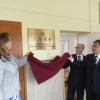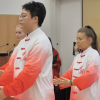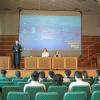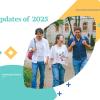EDUC-SHARE Science Journalism Internships 2023 - Call for Applications
2023
Feb
20
The EDUC-SHARE project (H2020) – the research and innovation part of the EDUC (European Digital UniverCity) Alliance - offers a science journalism internship for students from media relations, journalism, and communication fields of study. They will have the opportunity to cover a specific priority research topic defined by the EDUC Alliance (see the list below).
From the eight partner universities of the EDUC Alliance, six partner universities identified one or two priority research topics:
• Lifelong Health and Wellbeing (University of Pécs, Hungary)
• Culture and Heritage (University Paris Nanterre, France)
• Justice, Inequality, and Inclusion (University Paris Nanterre, France)
• Mobility / Smart Cities (University of Rennes, France)
• European Union Studies (University of Cagliari, Italy)
• Sustainable Changes: Climate and Resources (University of Potsdam, Germany)
• Cyber Security and Artificial Intelligence (Masaryk University, Czech Republic)
Internship Description
This an opportunity for journalism and communications students to practice their skills in genuinely scientific environments: participants will meet researchers, learn about their studies and projects, and report their findings and upcoming initiatives to the general public. The internship includes a 1-week-long funded mobility to visit the researchers at their home institutions abroad. After the internship, students will prepare a set of PR materials that will be shared and published.
After a successful application, an internship tutor will be assigned to each student and will agree with them on a program for the whole internship.
Each student will be connected to one of the research topics listed above. The internship will be scheduled in two stages:
1) During the first stage, they will get in touch with relevant scientists to find out their research and use the knowledge to draw up/draft PR outcomes such as articles, social network posts, interviews, stories, podcasts, and videos. Selected students will cooperate and exchange experiences and insights through a web collaboration platform receiving feedback on their work. Most of the exchange between students and researchers during this stage will be hosted online.
www.educalliance.eu
2) Students who complete the first stage will be offered a one-week funded physical mobility (1450 €) and may continue with the internship in the selected university.
The student who completes the whole internship will receive a final certificate. The internship mobility will take place in the spring semester of 2023. All PR materials and outcomes must be created in English.
Timeline of the internship:
- February 20 – March 12: collecting applications
- March 13 – March 26: applications evaluation process
- Beginning of April: start of the internship (online part of the research, students will be contacted via email), exchanges with the internship tutor, get to know the research and the EDUC Alliance
- End of April: deadline for delivering 1st set of PR materials to the host university
- May/June: possible physical mobility, delivering of 2nd set of PR materials, end of the internship
Application rules and process
Who can apply:
Bachelor's and Master's students of journalism, media studies, or similar communication fields from the University of Pécs.
Application requirements
Language skills: English level B2 required
Other skills:
Basic knowledge of journalistic writing, various formats of media communication, and the concept of public relations
Creativity, initiative, and ambition are welcome, especially for the work in PR materials
Language of application: English
Language of research, and publication: English
Application deadline: Sunday, March 12, 2023
Application link: HERE, along with the following documents included in an official application form:
1) A short CV (including contact information, a field of study, and English level)
2) A short motivation letter (max. 1600 characters, including spaces)
3) A short answer to the question: What do you think science journalism is, and why is it important? (max. 500 characters including spaces)
4) Optional: work samples (articles, podcasts, social networks posts, interviews)
More information: educ@pte.hu
- Log in to post comments
University of Pécs | Chancellery | IT Directorate | Portal group - 2020.
















